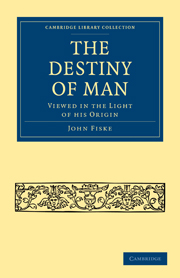Book contents
- Frontmatter
- PREFACE
- Contents
- I Man's Place in Nature as affected by the Copernican Theory
- II As affected by Darwinism
- III On the Earth there will never be a Higher Creature than Man
- IV The Origin of Infancy
- V The Dawning of Consciousness
- VI Lengthening of Infancy and Concomitant Increase of Brain-Surface
- VII Change in the Direction of the Working of Natural Selection
- VIII Growing Predominance of the Psychical Life
- IX The Origins of Society and of Morality
- X Improvableness of Man
- XI Universal Warfare of Primeval Men
- XII First checked by the Beginnings of Industrial Civilisation
- XIII Methods of Political Development, and Elimination of Warfare
- XIV End of tie Working of Natural Selection upon Man. Throwing off the Brute-Inheritance
- XV The Message of Christianity
- XVI The Question as to a Future Life
- References
I - Man's Place in Nature as affected by the Copernican Theory
Published online by Cambridge University Press: 29 August 2010
- Frontmatter
- PREFACE
- Contents
- I Man's Place in Nature as affected by the Copernican Theory
- II As affected by Darwinism
- III On the Earth there will never be a Higher Creature than Man
- IV The Origin of Infancy
- V The Dawning of Consciousness
- VI Lengthening of Infancy and Concomitant Increase of Brain-Surface
- VII Change in the Direction of the Working of Natural Selection
- VIII Growing Predominance of the Psychical Life
- IX The Origins of Society and of Morality
- X Improvableness of Man
- XI Universal Warfare of Primeval Men
- XII First checked by the Beginnings of Industrial Civilisation
- XIII Methods of Political Development, and Elimination of Warfare
- XIV End of tie Working of Natural Selection upon Man. Throwing off the Brute-Inheritance
- XV The Message of Christianity
- XVI The Question as to a Future Life
- References
Summary
When we study the Divine Comedy of Dante — that wonderful book wherein all the knowledge and speculation, all the sorrows and yearnings, of the far-off Middle Ages are enshrined in the glory of imperishable verse — we are brought face to face with a theory of the world and with ways of reasoning about the facts of nature which seem strange to us to-day, but from the influence of which we are not yet, and doubtless never shall be, wholly freed. A cosmology grotesque enough in the light of later knowledge, yet wrought out no less carefully than the physical theories of Lucretius, is employed in the service of a theology cumbrous in its obsolete details, but resting upon fundamental truths which mankind can never safely lose sight of. In the view of Dante and of that phase of human culture which found in him its clearest and sweetest voice, this earth, the fair home of man, was placed in the centre of a universe wherein all things were ordained for his sole behoof: the sun to give him light and warmth, the stars in their courses to preside over his strangely checkered destinies, the winds to blow, the floods to rise, or the fiend of pestilence to stalk abroad over the land, — all for the blessing, or the warning, or the chiding, of the chief among God's creatures, Man. Upon some such conception as this, indeed, all theology would seem naturally to rest.
- Type
- Chapter
- Information
- The Destiny of ManViewed in the Light of his Origin, pp. 11 - 17Publisher: Cambridge University PressPrint publication year: 2009First published in: 1884

